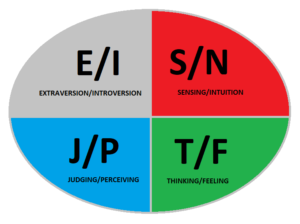A critique of 16personalities

December 10, 2018
Thousands upon thousands of personality tests and quizzes can be found online. People always seem to be on a eager to categorize or identify themselves with something whether it be in a theoretical or actual model. 16personalities.com is the first website that pops up when you search “personality test”. As of December 5th, 158,068,510 tests have been taken and the site. The test has also been shared directly from their website on social media over 1 million times. It’s internet presence has been confirmed to say the least with plenty of more shares coming from other pages on their website.
The site is free to use and you don’t have to create an account to take the test; it’s easy to navigate and showcases a simple yet generally fun design. There are 16 different personality types you can be sorted into on the site based on 5 dichotomies: introversion-extroversion, observant-intuitive, thinking-feeling, prospecting-judging, and a turbulent-assertive. If you’re at all familiar with Carl Jung and his theories of personality alongside Isabelle Myers-Briggs, these concepts will sound all too familiar yet a bit off. It’s accessibility is what has spawned its popularity, but it truly is just a rip off of a personality typology theory known as MBTI developed in part by these renowned psychologists.
This popular website has taken MBTI and oversimplified it to the point of embarrassment. Don’t get me wrong, the problem isn’t necessarily the people who use it, just the fact that certain concepts of the theory are being flat out ignored with the website’s clear intent to be a replacement of that very same theory. On their site, they claim to be a blend of MBTI and the Big Five but this is only if you look at the fine print. It’s unreasonable to use the exact acronyms for identifying different results and not expect most people to assume two things are one in the same. This is shown by the extremely small amount of shares on the page about their actual “theory” relative to the total people who have used it. If one does not bother to look into the theory more, MBTI becomes a synonym of this website which is not true for various reasons. MBTI in its most basic form results in dichotomies which is what the 16personalities website focuses on but a whole portion of the theory with the ‘cognitive functions’ is ignored.
The developers of 16personalities.com are aware of this kind of deception they are putting out towards the public. In fact, a discussion of any other personality theory including MBTI, enneagram, Big 5, and others is strictly forbidden in the discussion portion of their site. On most forum style sites, content is only removed if it is inappropriate (hate speech, explicit references, etc.) but even the mention MBTI or any of its principals automatically flag messages for review. The intent is clear: they don’t want their website users to be aware of personalities theories in actual psychology even the ones in which they base 95% of their own theory on.
I honestly don’t mind if people use the website for fun and the information the website provides isn’t all bad and it’s actually how my interest in personality typology got its start. My problem, however, is the lack of awareness and respect for MBTI as a theory that has come about because of this website instead of touting their theory as the almighty. 16personalities is separate from MBTI and that is a fact and I think this needs to be way more advertised than it currently is. If you are interested in learning more about MBTI, I would recommend visiting the The Myers & Briggs Foundation official website.